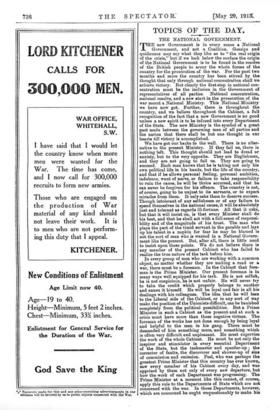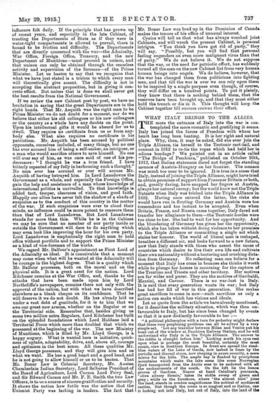TOPICS OF THE DAY.
THE NATIONAL GOVERNMENT.
THE now Government is in every sense a National Government, and not a Coalition. Gossips and quidnuncs may say what they like as to " the real origin of the crisis," but if we look below the surface the origin of the National Government is to be found in the resolve of the British people to array the whole forces of the country for the prosecution of the war. For the past two months and more the country has been stirred by the thought that only through national concentration shall we achieve victory. But clearly the first step in national con- centration must be the inclusion in the Government of representatives of all parties. National concentration, national resolve, and a new start in the prosecution of the war meant a National Ministry. This National Ministry we have now got. Further, there is throughout the country, and we believe throughout the Cabinet, a full recognition of the fact that a new Government is no good unless a new spirit is to be infused into every Department of the State. The new Ministry is the symbol of a great pact made between the governing men of all parties and the nation that there shall be but one thought in our hearts till victory is accomplished.
We have got our backs to the wall. There is no alter- native to the present Ministry. If they fail us, there is nothing left. This thought should not lead to dread or anxiety, but to the very opposite. They are Englishmen, and they are not going to fail us. They are going to succeed. Each man knows that he is taking not only his own political life in his hands, but the life of the country, and that if he allows personal feeling, personal ambition, indolence, want of nerve, or failure to take responsibility to ruin the cause, he will be thrice accursed, and that he can never be forgiven for his offence. The country is not, of course, going to be unjust to its servants, or to expect miracles from them. It only asks them to deserve success. Though intolerant of any selfishness or of any failure to spend themselves in the national cause, it will be absolutely just and tolerant as regards ill-fortune. All that it asks, but that it will insist on, is that every Minister shall do his best, and that he shall act with a full sense of responsi- bility and of the magnitude of his trust. The man who plays the part of the timid servant in the parable and lays up his talent in a napkin for fear he may be blamed is not the sort of man who is wanted in a National Govern- ment like the present. But, after all, there is little need to insist upon these points. We do not believe there is any member of the present Cabinet who has failed to realize the true nature of the task before him.
In every group of men who are working with a common object, no matter whether they are making a road or a war, there must be a foreman. In the Cabinet that fore- man is the Prime Minister. Our present foreman is in many ways well equipped for his task. He is not selfish, he is not suspicious, he is not unfair. He will never try to take the credit which properly belongs to another and annex it himself. He will be loyal and fair in all his dealings with his colleagues. The idea that he will lean to the Liberal side of the Cabinet, or in any sort of way make the position of the Unionists difficult, can be banished completely from the political possibilities. But a Prime Minister in such a Cabinet as the present and at such a crisis must have more than these negative virtues. The foreman of the works has not done enough by being loyal and helpful to the men in his gang. There must be demanded of him something more, and something which is often very difficult and unpleasant. He must supervise the work of the whole Cabinet. He must be not only the inspirer and stimulator in every essential Department of the State, but the taskmaster and speeder-up ; the corrector of faults, the discoverer and shower-up of sins of commission and omission. Peel, who was perhaps the greatest Prime Minister that this country has ever known, saw every member of his Cabinet every day, and was apprised by them not only of every new departure, but bow the work of each Department was progressing. The Prime Minister at a moment like this cannot, of course, apply this rule to the Departments of State which are not concerned with the war. In those Departments, however, which are concerned he ought unquestionably- to make his
influence felt daily. If the principle that has grown up of recent years, and especially in the late Cabinet, of treating the Departments of State as if they were in water-tight compartments is allowed to prevail, there is bound to be friction and difficulty. The Departments that are directly concerned with the war—the Admiralty, War Office, Foreign Office, Treasury, and the new Department of Munitions—must proceed in unison, and that unison can only be obtained through the ceaseless activity and supervision of the foreman—of the Prime Minister. Let us hasten to say that we recognize that what we have just stated is a truism to which every man will theoretically give assent. The difficulty is not in accepting the abstract proposition, but in giving it con- crete effect. But unless that is done we shall never get the best results from the National Government.
If we review the new Cabinet post by post, we have no hesitation in saving that the great Departments are in the right hands. That Mr. Asquith was the right man to be Prime Minister we do not doubt for a moment, nor do we believe that either his old colleagues or his new colleagues or the country as a whole have any doubts on the point. Upon his intellectual gifts it would be absurd for us to dwell. They require no certificate from us or from any- body else. What also requires no certificate is his patriotism. Mr. Asquith has been accused by political opponents, ourselves included, of many things, but no one has ever accused him of being a self-seeker, an intriguer, or a man who would sacrifice others to save himself. No one will ever say of him, as was once said of one of his pre- decessors: " I thought be was a true friend. I have bitterly repented of my folly in harbouring such a thought." No man ever has accused or ever will accuse Mr. Asquith of having betrayed him. In Lord Lansdowne the Government as a whole, and especially the Foreign Office, gain the help and assistance of a man whose knowledge of international politics is unrivalled. To that knowledge is added tact, temper, clearness of vision, and good faith. Happily our allies have never felt the shadow of a shade of suspicion as to the conduct of this country in the matter of the war. If such suspicions were ever to cloud their minds, no influence could be more potent to reassure them than that of Lord Lansdowne. But Lord Lansdowne stands for more than this. While he is in the Cabinet we may be sure that no member of our party inside or outside the Government will. dare to do anything which may even look like improving the hour for his own party. Lord Lansdowne is emphatically the right man to bold office without portfolio and to support the Prime Minister as 14 kind of vice-foreman of the works.
We regard Mr. Balfour's appointment as First Lord of the Admiralty as ideal. It is conceivable that a moment may come when what will he wanted at the Admiralty will be courage in the highest degree. That is a quality which Mr. Balfour possesses, both on the moral and on the physical side. It is a great asset for the nation. Lord Kitchener remains at the War Office, and, thanks to the attacks that have been made upon him by Lord Nortlicliffe's newspapers, remains there not only with the approval of the nation, but with what we have described elsewhere as a blank cheque on its confidence. That he will deserve it we do not doubt, He has already laid us tinder a vast debt of gratitude, for it is to him that we owe our great new armies, whether on the Regular or on the Territorial side. Remember that, besides giving us some two million extra Regulars, Lord Kitchener has built on the splendid foundations which Lord Haldane laid a Territorial Force which more than doubled that which we possessed at the beginning of the war. The new Ministry of Munitions, which is filled by Mr. Lloyd George, is a happy augury. What is wanted here is initiative, quick- ness of uptake, adaptability, drive, and, above all, courage and optimism in the best sense. All these qualities Mr. Lloyd George possesses, and they will give him and us what we want. He has a good heart and a good head, and he is not going to allow himself or us to be beaten. That Mr. Boner Law is Colonial Secretary, Mr. Austen Chamberlain Indian Secretary, Lord Selborne President of the Board of Agriculture, Lord Curzon Lord Privy Seal, and Sir Edward Carson and Mr. F. E. Smith the two Law Officers, is to us a source of sincere gratification and security. It shows the nation how futile was the notion that the Unionist Party was lacking in leaders. The fact that
Mr. Boner Law was bred up in the Dominion of Canada makes the tenure of his office of unusual interest.
Cynics will tell us that what has always wrecked joint Cabinets, and will wreck the present Cabinet, is personal intrigue. "You think you have got rid of party," they will say. "Possibly, but you will find that personal feeling engenders an even more malignant virus than that of party." We do not believe it. We do not suppose that the war, or the need for patriotic effort, has suddenly turned all the men on the new Cabinet list from very human human beings into angels. We do believe, however, that the war has changed them from politicians into fighting men, and that till the war is over we can rely upon them to be inspired by a single purpose even though, of course, they will differ on a hundred points. To put it plainly, they know that there is nothing behind them, that the reserves have been brought up, and that they must either hold the trench or die in it. This thought will keep the Cabinet together till success crowns their effort.



































 Previous page
Previous page